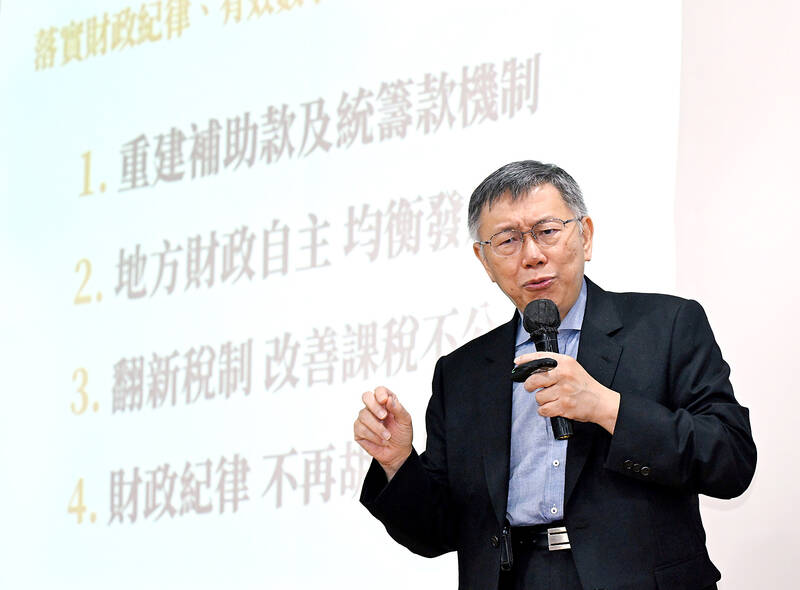The Democratic Progressive Party (DPP) yesterday accused Taiwan People’s Party (TPP) Chairman and presidential candidate Ko Wen-je’s (柯文哲) of financial mismanagement when he was Taipei mayor, rebutting the latter’s claim that he is the best in maintaining fiscal discipline and safeguarding taxpayers’ money.
“Ko is deceiving the public, touting his abilities to govern, save taxpayers’ money and pay off the city government’s debt, while accusing the central government of profligate spending,” DPP spokesman Chang Chih-hao (張志豪) told a news conference in Taipei. “It is Ko misleading the public again with wrong information.”
Pointing to Ko’s claim that he had paid off Taipei’s NT$57 billion (US$1.76 billion) debt, DPP spokeswoman Michelle Lin (林楚茵) said that Ko borrowed reserved funds from foundations and agencies under the city government’s administration, and used the money to window-dress the figures.

Photo: Liao Chen-huei, Taipei Times
“It is an old accounting trick — borrowing from Peter to pay Paul — which depletes assets under government control,” she said.
Chang and Lin were responding to Ko’s presentation earlier yesterday of his political platform, in which he said he would focus on fiscal restraint and government responsibility, as he accused the DPP government of having poor financial policies, extravagant spending and unequal resource allocation that has created poor and wealthy regions.
Ko is known for his “eight big project failures,” which cost taxpayers more than NT$400 million, Chang said.
These included NT$3 million to set up mask vending machines during the peak of the COVID-19 pandemic, with only 24 masks being sold per day, he said.
Another big flop was the NT$11.82 million spent on a “mobile police station” pilot program, which was terminated early, he said.
Ko also approved NT$70 million for the city government to set up 69 apps to provide better services to residents, but 54 of them have been taken down, resulting in losses at least NT$33.5 million, he said.
The city government, led by Ko, spent NT$138 million for displays and activities for the 2016 Taipei World Design Capital event, but some display items repeatedly broke down, Lin said.
Another NT$71 million went into the 2020 Taipei Lantern Festival, which garnered bad reviews, receiving only a 28 percent satisfactory rating, the lowest ever for similar events hosted by other cities over the years, she said.
During his presentation earlier yesterday, Ko presented four guidelines for government.
First is to promote more equitable distribution of tax revenues by applying current standards on fund allocation for the six special municipalities to all other cities and counties.
Second is to push for fiscal autonomy for local governments by drafting policies that would boost tax revenues to promote more balanced development in poorer municipalities.
Third is convening national meetings to discuss tax reforms, including abolishing the entertainment tax and stamp duty, and creating an oversight mechanism to prevent the rich from not paying their fair share of taxes, including taxes on income earned abroad.
Fourth is pursuing fiscal discipline, including stopping tax collections that have resulted in large surpluses in recent years.
He said President Tsai Ing-wen’s (蔡英文) administration have trumpeted its revenue surplus of NT$180 billion last year, which he said the central government had squandered.
Additional reporting by Chen Cheng-yu

An essay competition jointly organized by a local writing society and a publisher affiliated with the Chinese Communist Party (CCP) might have contravened the Act Governing Relations Between the People of the Taiwan Area and the Mainland Area (臺灣地區與大陸地區人民關係條例), the Mainland Affairs Council (MAC) said on Thursday. “In this case, the partner organization is clearly an agency under the CCP’s Fujian Provincial Committee,” MAC Deputy Minister and spokesperson Liang Wen-chieh (梁文傑) said at a news briefing in Taipei. “It also involves bringing Taiwanese students to China with all-expenses-paid arrangements to attend award ceremonies and camps,” Liang said. Those two “characteristics” are typically sufficient

A magnitude 5.9 earthquake that struck about 33km off the coast of Hualien City was the "main shock" in a series of quakes in the area, with aftershocks expected over the next three days, the Central Weather Administration (CWA) said yesterday. Prior to the magnitude 5.9 quake shaking most of Taiwan at 6:53pm yesterday, six other earthquakes stronger than a magnitude of 4, starting with a magnitude 5.5 quake at 6:09pm, occurred in the area. CWA Seismological Center Director Wu Chien-fu (吳健富) confirmed that the quakes were all part of the same series and that the magnitude 5.5 temblor was

The brilliant blue waters, thick foliage and bucolic atmosphere on this seemingly idyllic archipelago deep in the Pacific Ocean belie the key role it now plays in a titanic geopolitical struggle. Palau is again on the front line as China, and the US and its allies prepare their forces in an intensifying contest for control over the Asia-Pacific region. The democratic nation of just 17,000 people hosts US-controlled airstrips and soon-to-be-completed radar installations that the US military describes as “critical” to monitoring vast swathes of water and airspace. It is also a key piece of the second island chain, a string of

The Central Weather Administration has issued a heat alert for southeastern Taiwan, warning of temperatures as high as 36°C today, while alerting some coastal areas of strong winds later in the day. Kaohsiung’s Neimen District (內門) and Pingtung County’s Neipu Township (內埔) are under an orange heat alert, which warns of temperatures as high as 36°C for three consecutive days, the CWA said, citing southwest winds. The heat would also extend to Tainan’s Nansi (楠西) and Yujing (玉井) districts, as well as Pingtung’s Gaoshu (高樹), Yanpu (鹽埔) and Majia (瑪家) townships, it said, forecasting highs of up to 36°C in those areas